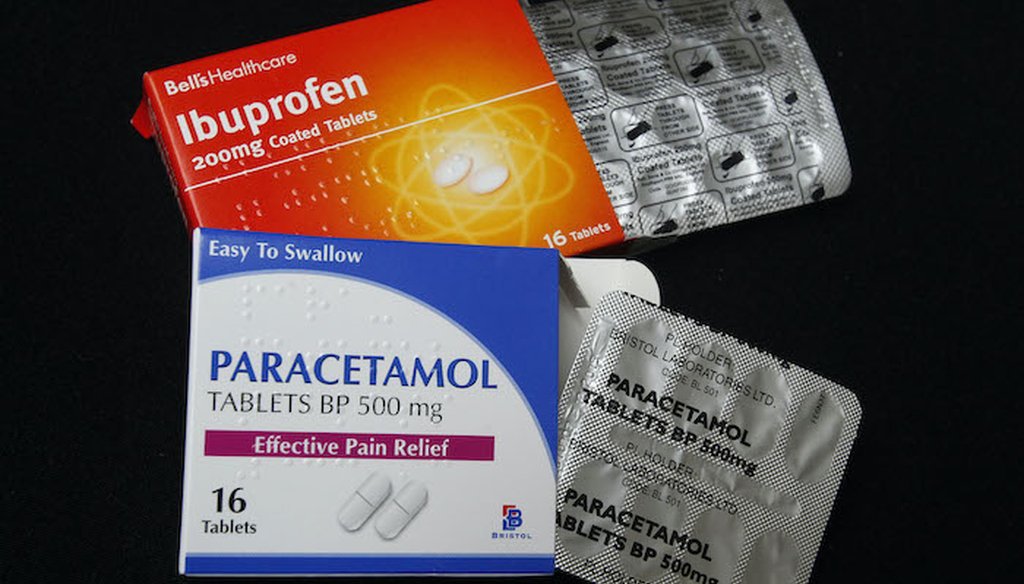Stand up for the facts!
Our only agenda is to publish the truth so you can be an informed participant in democracy.
We need your help.
I would like to contribute

Some medical experts are concerned the anti-inflammatory properties of ibuprofen could dampen the body's immune response as it fights the coronavirus, but this is only a theory. (Associated Press)
If Your Time is short
-
Some medical experts believe ibuprofen’s anti-inflammatory properties could dampen the immune system’s response to fighting off COVID-19.
-
But professionals also say this is just a theory and that there’s no scientific evidence that links ibuprofen and other anti-inflammatory medications with COVID-19 complications.
-
Experts agree that more research is needed.
Got a fever? Feeling achy? If so, it makes sense that you’d want to take ibuprofen, the over-the-counter anti-inflammatory often recommended for those symptoms.
But recent claims on social media warn that this everyday remedy could increase the risk of complications with a COVID-19 infection.
Knowing the facts has never been more important. Please consider donating to PolitiFact today.
Is there any truth here?
We have a two-part answer. Medical experts say the claim has no scientific backing. But they also acknowledge that more research needs to be done, especially with respect to patients with certain conditions such as hypertension and diabetes. Public health experts in England, at least, said the question is significant enough that its National Health Service recommended some patients exercise caution.
Sign up for PolitiFact texts
RELATED: We answered your questions on coronavirus seasonality, immunity and transmission
A Facebook post claims it’s dangerous to take ibuprofen if you have COVID-19 and suggests the virus "thrives" on the medicine.
"I have a doctor in the family who has been given information from Vienna’s laboratory studying COVID-19 and (sic) vast majority of people who died of it, had ibuprofen in their system so do not take it!! Those who recovered did not take ibuprofen so if you have symptoms, take Paracetamol only!!! Looks like this virus thrives on ibuprofen so don’t do it and tell everyone you can!!!"
The post was flagged as part of Facebook’s efforts to combat false news and misinformation on its News Feed. (Read more about our partnership with Facebook.)
This information is based on some genuine medical advice, but it distorts facts and makes unfounded assertions.
First, we could find no credible evidence that states that the "vast majority" of the thousands who have died with COVID-19 so far all had ibuprofen in their systems. Nor have we seen any medical experts suggest that the medicine played a role in any of these COVID-19 related deaths.
Rumors about ibuprofen and COVID-19 largely took off after France’s Health Minister, Olivier Véran, tweeted that "taking anti-inflammatory drugs (ibuprofen, cortisone …) could be a factor in worsening the infection. If you have a fever, take paracetamol." Paracetamol is the generic name used in Europe for acetaminophen, also known as Tylenol.
Some European doctors and scientists agreed with him and have recommended people take a drug like Tylenol instead of ibuprofen or Advil as scientists study the matter. But other medical experts say there’s no scientific evidence that links anti-inflammatory medicines such as ibuprofen with worsening COVID-19 infections.
To cut through the confusion, we’ve compiled responses from health experts to give you the best idea on what the medical community knows, and recommends, regarding ibuprofen and COVID-19.
A statement from the National Institute of Allergy and Infectious Diseases says evidence is scarce and there needs to be more research:
"More research is needed to evaluate reports that ibuprofen and other over-the-counter anti-inflammatory drugs may affect the course of COVID-19. Currently, there is no conclusive evidence that ibuprofen and other over-the-counter anti-inflammatory drugs increases the risk of serious complications or of acquiring the virus that causes COVID-19. There is also no conclusive evidence that taking over-the-counter anti-inflammatory drugs is harmful for other respiratory infections."
The World Health Organization told PolitiFact it is aware of concerns on the use of non-steroidal, anti-inflammatory drugs for the treatment of fever for people with COVID-19 but "after a rapid review of the literature, WHO is not aware of published clinical or population-based data on this topic."
"We are consulting with physicians treating COVID-19 patients and are not aware of reports of any negative effects of ibuprofen, beyond the usual known side effects that limit its use in certain populations. Based on currently available information, WHO does not recommend against the use of ibuprofen."
Here’s why there is some concern: Some medical professionals believe that the medicine’s anti-inflammatory properties could dampen the body’s immune response.
A March 11 letter in The Lancet medical journal discussed the risk of COVID-19 in patients with hypertension and diabetes. It states that the virus binds to so-called ACE2 receptors on the surfaces of cells and that some anti-inflammatory medicines like ibuprofen helps stimulate those cells. So, the letter theorizes that these medications may, in turn, worsen COVID-19.
But medical experts say this is just theory.
Some anecdotal stories about experiences with the drug and COVID-19 have also received attention. Health experts say there isn’t enough research to make a sole determination.
Some medical organizations recommend using caution and suggest refraining from use of non-steroidal anti-inflammatory medications like ibuprofen until more studies are done.
While acknowledging there’s no evidence ibuprofen can make coronavirus worse, England's National Health Service is one of the organizations that is recommending people err on the side of caution.
"Until we have more info, take paracetamol to treat the symptoms of coronavirus, unless your doctor has told you paracetamol is not suitable for you," NHS wrote in a tweet on March 18.
With the current coronavirus being so new, there is not enough credible information to say for sure whether ibuprofen can negatively impact patients with coronavirus. Right now, people should remain skeptical about sweeping statements that make bold claims about the medicine and the virus.
Our Sources
Facebook post, March 16, 2020
BBC, Coronavirus and ibuprofen: Separating fact from fiction, March 17, 2020
Al Jazeera, No evidence ibuprofen worsens coronavirus: EU drugs watchdog, March 18, 2020
Los Angeles Times, There’s no good reason to avoid ibuprofen if you’re infected with the coronavirus, March 18, 2020
People, Does Taking Ibuprofen Make Coronavirus Worse? Here's What Experts Have to Say, March 18, 2020
NBC News, Should you be worried about taking ibuprofen for coronavirus? No, experts say., March 18, 2020
Lancet medical journal, Are patients with hypertension and diabetes mellitus at increased risk for COVID-19 infection?, March 11, 2020
Email interview, Judith Lavelle Technical Writer-Editor for the National Institute of Allergy and Infectious Diseases, March 18, 2020
Email interview, Andrei Muchnik spokesperson at the World Health Organization, March 19, 2020










































